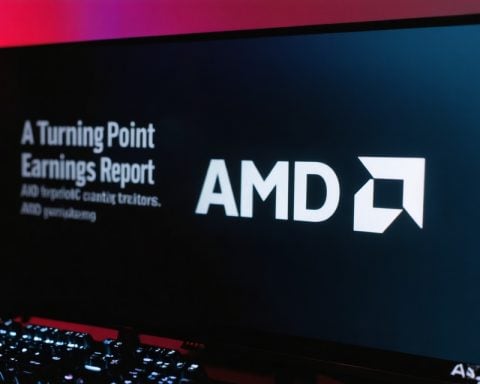- Lumen’s stock fell by 7.1%, mirroring a broader market downturn with the S&P 500 and Nasdaq Composite also declining.
- Nvidia is highly anticipated to announce significant financial results, potentially reporting $21.2 billion in net income from $38 billion in revenue.
- Investors are keenly focused on Nvidia’s future guidance, which could rejuvenate tech stocks if positive.
- Microsoft’s potential slowing down of data center expansion could impact Lumen, especially given its recent gains from AI-related deals.
- The interplay between Microsoft and Nvidia’s strategies concerning AI developments holds pivotal market implications.
- The market closely watches as tech giants’ decisions on AI could determine future stock trajectories.
As the closing bell rang and Wall Street’s tumultuous dance drew to a close, Lumen’s stock lay slumped, a stark 7.1% below where it began. In the shadow of its stumble, the broader market also grappled with bearish winds, as the S&P 500 and Nasdaq Composite edged downwards, painting a gloomy picture.
Yet, all eyes were fixed on Nvidia, poised to unveil what could be the watershed moment of the year. The anticipation was palpable, akin to awaiting the debut of a blockbuster film, with whispers of $21.2 billion in net income on the back of $38 billion in revenue swirling through the financial grapevine. The impending announcement promised not just numbers, but potential ripple effects through the tech stock sphere.
The focus is sharp, not just on Nvidia’s financial performance but on the whispered guidance for upcoming quarters. A strong showing might inject the much-needed adrenaline back into tech stocks, reigniting the fire that once roared.
Adding layers to the tension were recent murmurings from Microsoft, suggesting a throttle on their expansive data center ambitions. For Lumen, recent high-flying gains found roots in deals with Microsoft’s burgeoning AI endeavors. But with whispers of scaling back, those roots now tremble.
Investors will have an eager eye on Nvidia’s narrative, as Microsoft, Nvidia’s major patron, hints at caution against AI’s overexuberance. Lumen’s rollercoaster ride over the past year could encounter new heights—or fresh descents—depending on how these tech giants chart their courses through the swirling currents of AI expectations. The stakes are high; the market waits with bated breath.
The Tech Market’s Crucial Crossroads: Nvidia’s Impact and AI’s Future
How Nvidia’s Earnings Could Reshape the Market
Nvidia stands at a pivotal moment, with an expected announcement that could significantly influence tech stocks and broader financial markets. With projections of $21.2 billion in net income on $38 billion in revenue, Nvidia’s performance is under intense scrutiny for several reasons:
1. Market Domino Effect: Nvidia’s role as a leader in GPUs and AI technology means that positive financial results and optimistic future guidance could uplift tech stocks, potentially reversing bearish trends seen in indexes like the S&P 500 and Nasdaq Composite.
2. AI and Data Center Dependencies: Companies like Lumen are significantly impacted by industry leaders such as Nvidia and Microsoft. A downturn in Nvidia could imply reduced momentum in AI projects, impacting stakeholders across the supply chain.
3. Broader Economic Signals: Tech stocks often act as a barometer for economic health. A strong Nvidia performance may signal robust future market conditions, instilling confidence among investors and boosting market sentiment.
Real-World Use Cases for Nvidia Technologies
Nvidia’s impact extends beyond financials and directly into various industry applications:
– Healthcare: Nvidia’s AI technologies are pioneering personalized medicine, enabling faster and more accurate diagnostics.
– Automotive: Their platforms support autonomous vehicle development, providing safer and more efficient transportation solutions.
– Gaming: Nvidia’s GPUs have set the standard for graphics performance, continuing to enhance user experiences in gaming.
Market Forecasts & Industry Trends
According to a report by Gartner, the AI and GPU markets are set to grow exponentially over the next five years, driven by increasing demand for data processing and machine learning capabilities. Nvidia is well-positioned to capitalize on these trends, potentially justifying their high market valuation.
Nvidia vs. Competitors: Reviews & Comparisons
Nvidia’s primary competitors include AMD and Intel. While AMD is known for competitive pricing and performance in gaming, Intel’s focus is shifting towards integrated AI solutions. Each has unique strengths: Nvidia leads in AI and deep learning, AMD is strong in consumer markets, and Intel focuses on enterprise solutions.
Potential Implications of Microsoft’s Caution
Microsoft’s suggestion of scaling back data center growth introduces the possibility of reduced demand for Nvidia’s products, given their interwoven partnerships. This prudent approach could delay or dilute the anticipated AI-driven market growth.
Controversies & Limitations of AI Adoption
The AI industry, albeit promising, faces certain challenges:
– Ethical Concerns: Issues around data privacy and algorithmic bias are increasingly under scrutiny.
– Infrastructure Challenges: Building and maintaining data centers is resource-intensive, raising sustainability issues.
– Economic Displacement: The rapid adoption of AI might lead to workforce disruptions, requiring proactive management.
Actionable Recommendations and Quick Tips
For investors and tech enthusiasts looking to navigate these turbulent times:
– Diversify Portfolios: Balance tech investments with other sectors to mitigate risks.
– Stay Informed: Keep abreast of industry reports and earnings announcements to identify trends early.
– Engage with Innovations: Consider emerging tech and AI applications relevant to your industry to gain competitive advantages.
For more insights and updates, explore official resources and reports at Nvidia and Microsoft. These platforms provide a wealth of information on their latest developments and strategic directions.



















